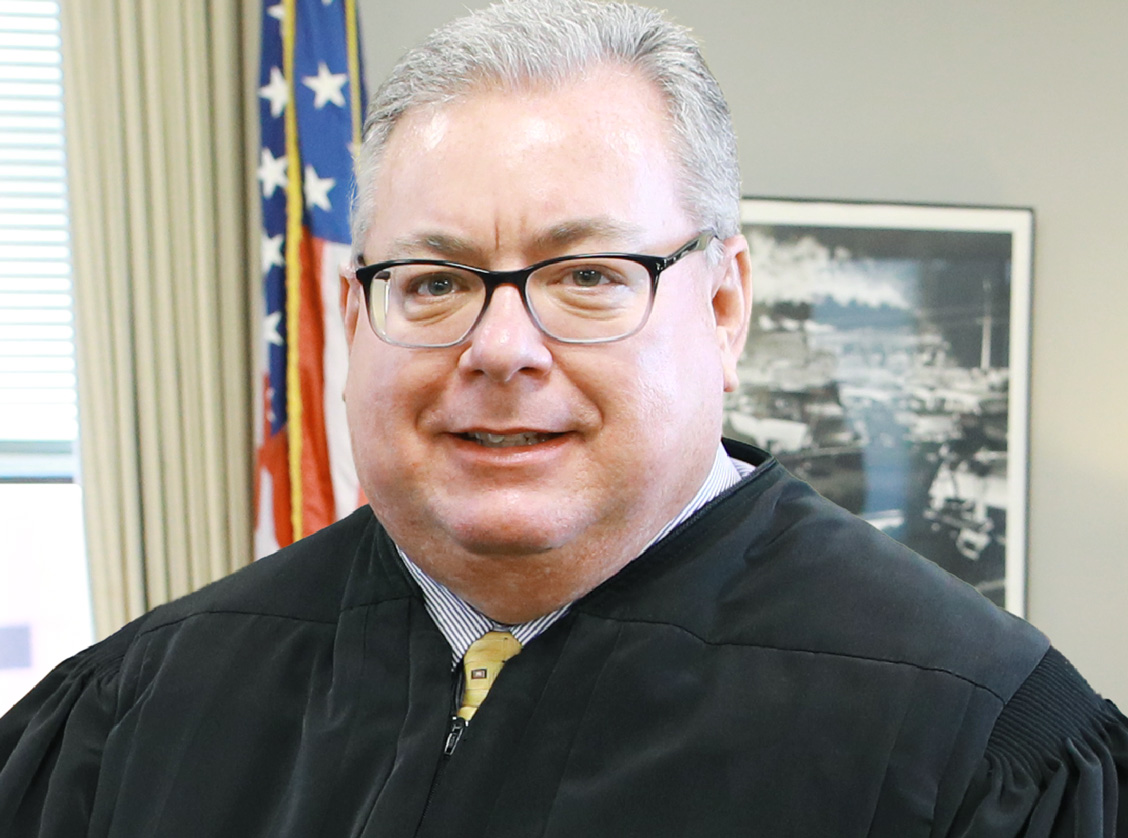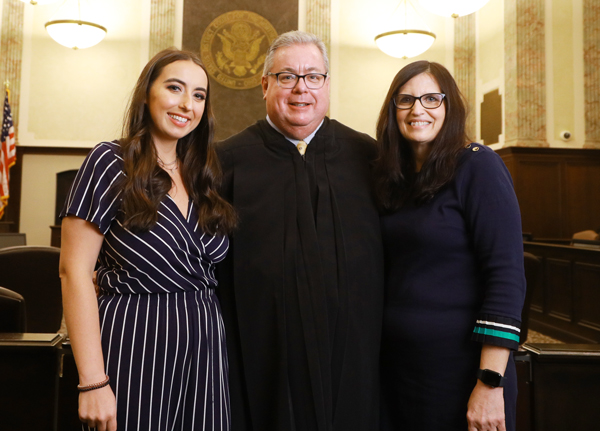James Knepp '92
Seizing Opportunities Leads to Career in the Courts
Feb. 1, 2021

James Knepp '92 was sworn in as a United States District Judge for the Northern District of Ohio on Nov. 19, 2020, after serving 10 years as a U.S. magistrate judge. Jim loved serving as a magistrate judge and has discovered that being a judge is what he was supposed to do. As a magistrate judge, Jim was primarily involved with civil litigation on his consent docket and settlement conferences on referral from other judges. He also made decisions on administrative appeals and pretrial matters in criminal cases, including warrants, arraignments, initial appearances, and detention hearings.
In his new role as a district judge, Jim is responsible for felony cases in their entirety, including trials and sentencing as well as a much larger civil docket. Jim finds the most satisfying aspect of his judicial career to be helping people solve problems. He looks forward to continuing to do so in his expanded role as a district judge.
Jim received his B.A., magna cum laude, in communications from Mount Union College, an M.A. in mass communication from Bowling Green State University, and holds a J.D., summa cum laude, from The University of Toledo College of Law where he was class valedictorian. Jim met his future wife, Linda, also class of 1992, at Toledo Law. Their daughter, Sarah, is now a first-year law student at the college.
Read more about the Knepp family of Rockets in the February issue of the UToledo Alumni eMagazine.
Q&A with Jim Knepp
How did you find your way to Toledo Law?
I grew up dreaming of being on the radio and went to college in pursuit of that. I
took a business law class taught by an adjunct professor who was a lawyer (and then
judge) in Alliance, Ohio, named Robert Lavery. He taught the class as if we were in
law school, using a casebook as the text, employing Socratic method lectures, and
providing Green Books for the final exam essays. On the cover of my final exam, Lavery
wrote, "Knepp, stop BS-ing yourself playing radio guy—you need to go to law school."
After pursuing a graduate degree in mass communication and working at multiple radio and TV stations and at a recording studio, I finally decided that maybe Professor Lavery was right. I took the LSAT, did pretty well, and settled upon attending law school in Columbus for the fall of 1989, mostly because of the football team at that school. After making that decision, my brother got hired as a graduate assistant football coach at The University of Toledo in the spring of 1989. He was coming out to campus for some meetings with the coaching staff, and I tagged along. Even though I had chosen another school, I had never actually set foot in a law school and thought it might be fun to take a tour. I wandered over to the law school and asked the person in the admissions office if I might be able to get a tour. She asked me to fill out a card with my name, address, undergrad grades, LSAT score, etc. Instead of a tour, the next thing I knew, I was up in the administration suite sitting next to then Associate Dean Phil Closius, who, in so many words, told me I would be crazy not to come to Toledo. He admitted me on the spot and awarded me a scholarship. So, what turns out to have been one of the best and most important decisions of my life, started out as a way just to pass a couple of hours. To make the chain of coincidences even more profound, I didn't know it then, but Robert Lavery was a 1976 graduate of Toledo Law. In hindsight, I just have to believe it was all meant to be.

Toledo Law legacy family with Sarah 1L, Jim and Linda Knepp (class of '92)
Do you have a favorite memory from attending Toledo Law?
I should probably say meeting my wife, right? But beyond that, I loved the social
aspect of law school generally. I made lifelong friends among my classmates, and my
favorite memories all involve them.
Do you have a favorite professor?
It wouldn't be fair to pick one—as I have fond memories of legal—and life—lessons
I learned from several of them.
How did Toledo Law prepare you for your career?
I know the academics at Toledo Law made me competitive professionally. I had summer
associate experiences at two large law firms, and the students from what would have
been considered more prestigious schools didn't have anything on me by way of preparation.
I also participated in the prosecutor clinic and had an opportunity to try several
cases in municipal court as a 3L, so I had actual experience trying cases before I
even graduated.
As you look back on your career, what were the turning points (in your education or
career) that led you to where you are now?
As a rising 3L, I had job offers in other cities but hadn't even really looked in
Toledo. At about that time, my then fiancé (and classmate) Linda decided that she
very much would like to stay in Toledo. Again, through some fortuity, as I was explaining
that dilemma to then Placement Director Joyce Shawaker, she said, "I think my Uncle
John is looking to hire a law clerk." "Uncle John" turned out to be Hon. John W. Potter,
U.S. District Judge for the Northern District of Ohio. Ms. Shawaker brokered the introduction
that resulted in me becoming his law clerk at the federal court in Toledo.
What were some of the positions you held/jobs you had following law school?
I was a law clerk to U.S. District Judge John W. Potter in the Northern District of
Ohio. I then became an associate at Robison, Curphey & O'Connell in Toledo. My practice
was almost exclusively civil litigation and focused primarily on defense of medical
malpractice actions and railroad grade crossing collisions. I became a partner at
RCO and had some success defending railroads in grade crossing litigation, such that
a Class 1 railroad designated me as their national coordinating counsel for locomotive
video evidence, which I'm sure had something to do with the technical video production
knowledge I gained in graduate school, which impressed the director of the video evidence
program.
When/how did you decide you wanted to become a judge?
As a law clerk to a federal judge, it's hard even to dream that you could ever become
a judge yourself. It seemed about as realistic as a hot dog vendor getting called
out on the field to play third base. But after 15 years or so in private practice,
although I felt like I had really hit my stride working with the railroad on the video
program, I also had a longstanding thought, based on things other lawyers had said
to me over the years, that perhaps I was supposed to be a judge. So, when an opening
occurred, I entered the non-political merit selection race for U.S. magistrate judge
as a dark horse, taking my inspiration from the lottery's advertising campaign that
"you can't win if you don't play." It's something that I was sure I could do well,
but not confident at all I could be selected for from a field of candidates with what
I thought were better qualifications than mine. I was selected for the position and
sworn in back in July of 2010.
Your selection process to become an Article III judge began in April 2019 and finally
came to an end when you took the oath of office in November. What role did the pandemic
play in your hearing or confirmation process?
When I was nominated in early March 2020, after vetting by the Ohio Bipartisan Judicial
Selection Committee established by Senators Rob Portman and Sherrod Brown and the
White House and Department of Justice, they told me to expect a hearing later that
month. But COVID shut down hearings in the Senate Judiciary Committee for some time.
Finally, they began conducting hearings for judicial nominees by video conference,
and my hearing was conducted on July 29, with me appearing before the committee from
my office. While I missed the experience of actually being introduced and appearing
in person before the Judiciary Committee, I think it was less stressful to appear
remotely. After my nomination was reported out of committee, the first time I was
expecting to receive a floor vote for confirmation was during the time when the floor
shut down due to several senators contracting the virus. That delay, and the nomination
of Justice Amy Coney Barrett, pushed my final confirmation vote to the week following
the election.
What was the first thing you did after you were officially confirmed?
I received a call from Senator Portman from the Senate floor congratulating me and
telling me that I had enough votes for confirmation (I was watching on C-Span 2, but
there is no running tally of votes on the screen). Then I called Linda to tell her
the news. And then I poured a glass of bourbon and allowed it to sink in a bit.
What do you enjoy doing outside of work?
I love music, from singing in my church choir to "performing" at the annual Gridiron
Show to DJ-ing for school events and even the occasional friend or family wedding.
I'm loving living vicariously a bit through my daughter, Sarah, who is a first-year
law student at Toledo Law. I love traveling, and especially road trips. And I'm a
pretty good cook—my specialties are shrimp creole, red beans and rice, biscuits and
gravy, and anything on the grill.
What is the most challenging aspect of your role as a judge?
Sometimes there isn't a clear answer, but you still have to make a decision. I once
heard a wise judge explain that "being a good judge means having enough confidence
to make a decision—and enough humility to know that you might be wrong."
Do you have any suggestions for current law students or new lawyers who might be interested
in pursuing a career path similar to yours?
The best advice I can (and do) give to law students and young lawyers is to keep your
head up and always be looking around. You never know when an opportunity might be
right there for you to see, and if all you're doing is concentrating on a particular
task, you might miss an opportunity to connect with someone who could help set your
career on an entirely different trajectory. One of my law clerks, sitting in the audience
at a panel I was on speaking to the first-year writing section, raised his hand and
asked a question. By seeing that opportunity, he ultimately secured an externship
in my chambers, a summer associate position with my old law firm (resulting in a permanent
offer), and a clerkship with me following his graduation. All because instead of checking
his phone for texts and packing up to get out the door, he asked a question. From
my perspective, that simple act changed his life. And the only way for that to happen
to you is to keep your head up and your eyes open. And connect with people. You never
know where or when "career lightning" will strike.
What are you passionate about?
My family (including the furry kids). And helping people.
Is there anything else you would like alumni (or students) to know about you?
Deep down, I'm still just a farm boy from northeast Ohio.


